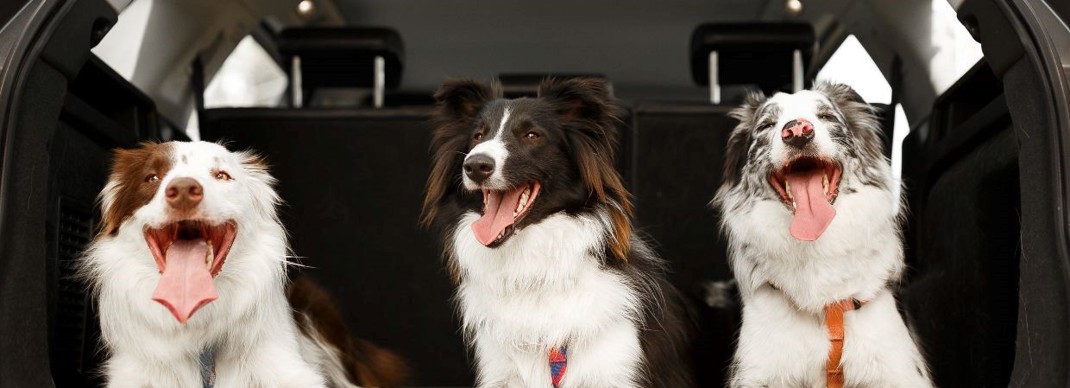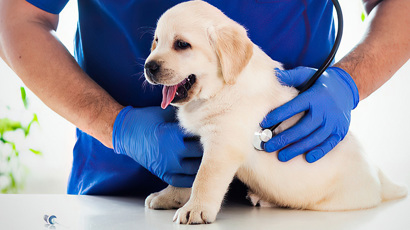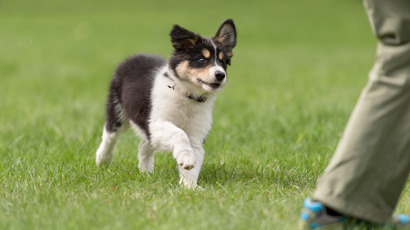Road Tripping with your Dog

How to Prepare for Taking your Dog on a Road Trip
These days we are so lucky that there are so many options for pet friendly accommodation, and it is very common to organise a road trip with dog along with everything else in the back seat.
But how do you ensure that the trip goes smoothly? Here are 5 top tips to help you prepare for taking a dog on a road trip with you.
1. Dog Safety and Well-Being in the Car
Restraining your dog in the car
Is it illegal to drive with dog in front seat? Like humans, dogs need to be safely restrained while driving, either in a secure crate or a harness. Your dog needs to be in a secured crate, in a car harness or in a cargo area of the car that is separated from the passengers such as in a wagon or SUV. It’s a good idea to check the dog restraint laws in your state to ensure you comply with the law.
It is illegal (and dangerous) to drive with a dog on your lap.
They should never travel in the front seat. Restraining your dog behind the driver’s seat is the safest option.
Use positive reinforcement
If you’re using a travel crate on your trip, use it beforehand at home for feeding meals, taking naps and other positive opportunities, such as tossing treats inside, helps when they go in the car.
Pheromones can reduce anxiety in the car
Adaptil® spray is a synthetic analogue of the pheromone that is emitted by a mother dog when feeding her puppies. Sprayed onto a familiar blanket 15 minutes prior to your puppy going into the car and placing the blanket in with them can help some puppies relax when travelling.
Toileting
I might be stating the obvious here, but remember to take your dog to the toilet just prior to leaving!
2) Take regular breaks
The general rule of thumb is to take a break every 1-2 hours to allow both the driver of the car and the dog to take a break and stretch their legs.
A helpful hint is to time breaks to when your dog is awake rather than interrupting a sleep.
Taking regular breaks will also help prevent a toileting accident from occurring (from the dog that is), which wouldn’t make the remainder of the road trip very pleasant! It is helpful to bring some baby wipes, plastic bags and some old towels in case you need to clean up a mess on the way.
3) Extra water
Ensure you take extra water in case of a breakdown and a portable travel water bowl to make life easy when travelling. The more remote the road you are travelling on is, the more water you should take with you in your car.
4) Feeding
I’d recommend feeding your dog at least 2 hours before leaving, not just before getting in the car, or you may have a car sick pooch a little while into your journey. For journeys that are 2-3 hours in length, there is no need to provide a full meal during your travels.
Although a little dried treat wouldn’t go astray during a break at half-way point to keep it a positive experience, but don’t go overboard.
For longer trips of 5-6 hours, a small half-sized meal can be given, provided you are stopping for at least an hour. If you’re only stopping for a short break, then wait until you reach your destination before you feed your dog.
For car trips of more than 6 hours, I usually recommend stopping overnight on the way at pet-friendly accommodation to avoid putting too much time pressure which can be stressful for both pet and owner.
5) Avoiding car sickness
Practice in the car without going anywhere
Set your dog up in their crate, harness or back seat and give a few special treats or even a meal while they are in a non-moving car. This is super important for car sick puppies to re-establish a positive association with the car.
Car sickness medication
If you know your dog is prone to getting car sick, prepare in advance and make an appointment with your vet, who can supply some travel sickness medication. This will make travel more pleasant for your dog and the humans in the car. Timing is important to ensure the medication is already working by the time you get into the car, so check with your vet when to give your dog the medication to prevent vomiting in the car.
The key to a successful road trip with the dog is to prepare well, be patient and stay positive! Your dog will love being included in your holiday and you will cherish those memories forever. Safe travels!
Adaptil® is a registered trademark of CEVA Animal Health.



